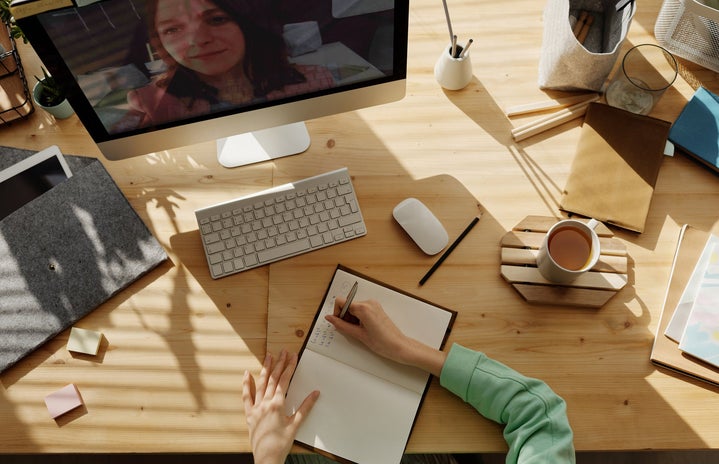Quarantine has highlighted many things about the world and about ourselves, but I found that the state of my mental health has been like a rollercoaster these past few months.
You might ask, “What do you mean? Everyone’s mental health has been all over the place.”
And I would say that you’re absolutely right. Here’s my maybe-not-so-unique take on this—my mental health mainly depends on how productive I am. And that realization was a hard one to take in.
Let me back up a second. Personally, I had no idea what I was going to do in quarantine. I would do schoolwork and maybe watch some Netflix, but other than that, I had no idea. On campus during spring semester, I was taking a course load of 17 credits, I worked as a professorial assistant in a research lab, I volunteered at a hospital, I volunteered to work with an elementary schooler, I was on the E-board for a few clubs, and I had some other obligations here and there. If you asked me what my stress level at the time was, I would have said “an absolute ten out of ten.”
Most of the people around me knew not to question what I was doing. I am a pre-med student with many obligations. Did all of them make me happy? I mean, yes, for the most part. I truly enjoyed everything that I did—and I was productive. This was my peak productivity.
Or so I thought.
Peak productivity doesn’t mean doing everything all of the time. Peak productivity is when you are doing many things, but you can still maintain a work-life balance. Say it with me: work-life balance.
I would have people tell me, “Ananya, you seem stressed. Are you okay?” and my immediate answer would be, “Yes! Absolutely! I’m just busy!” I would wave them off as if they didn’t know what they were talking about.
“I have a work-life balance. I see my friends, we do fun stuff, everything is fine.”
That got shut down really quickly. I came home soon after the announcement was made that my university was sending everyone home if possible, and I quickly ran into a problem.
“I don’t have enough to do. I do schoolwork, but what do I do now?”
I threw myself into any work I could find— finding more ways to improve HCMSU, or helping my younger brother with school, or studying way more than I usually did. My drive to be productive wasn’t stemming from a place of self-growth. It was stemming from a place of fear.
Quite recently, I have kept myself busy by taking online classes and working on a fundraiser project, but for a brief moment in time, I had nothing to do. I had just wrapped up the project and taken an exam, and for some reason, I started to worry.
Why on earth should I worry? My project was successful, and I knocked my exam out of the park. So what if I didn’t have anything to do?
Everything.
I couldn’t figure it out. Why was I losing my mind over having nothing to do? All my friends thought I was crazy— free time was free time! “You should be doing something FUN.”
Like I usually do, I waved them off.
“I am having fun! I’m spending time with my family, watching movies, and reading. I don’t usually do that during school anyway!”
Most people will shrug their shoulders and shake their heads at me, but one of my friends recently asked, “have you ever thought about WHY you feel the need to be productive?”
No. I had not. I never had. What was there to think about? I liked being productive. I thrived when I was productive.
Yeah, not really. Productivity had also been an excuse for me not to worry about whatever it is I was worried about at the time. I was afraid of being alone with myself, not having anything to do but think.
I mentioned this to my friend, and I was met with the following statement— “well, maybe if you are doing things to avoid thinking, maybe that’s exactly what you need to do.”
Do more thinking? Thinking too much was bad. Thinking too much led to problems. But, what I wasn’t doing was thinking enough.
I wasn’t allowing myself to process everything I do in a day. I woke up, I went about my day, and I went to bed, usually later than I would have liked. Being at home these past few months has forced me to think and process and learn.
For some people, this might help you figure out your need to be productive. But for me, thinking more just wasn’t it. There had to be something else.
I came across this post by Sahaj Kohli, an Indian American woman who is a therapist in training. She runs an Instagram account called Brown Girl Therapy, that has over 69,500 followers.
The quote says, “If you were praised only when you reached the next milestone, constantly compared to your peers, or reprimanded for slowing down, then it can be difficult to believe that your productivity doesn’t determine your worthiness.”
In the midst of all this thinking I was doing, I was taken aback. I was always praised for being productive as a child by family, teachers, role models, and other adults in my life. Never once had I attributed my need for productivity for a need to be liked or to feel worthy.
This was a hard thing to sit with, but it was an important realization nonetheless. My productivity is not directly related to my worth or my ability to be liked. I don’t need to be productive all the time to be a good person or to be successful.
If you find that this is something you resonate with, maybe take some time to not do anything at all. Work through those feelings of guilt or anxiety or whatever it is you may feel. We’ll figure it out together.
My work-life balance has gotten better, but it’s a work in progress.
I’m a work in progress.
And I’m okay with that.


